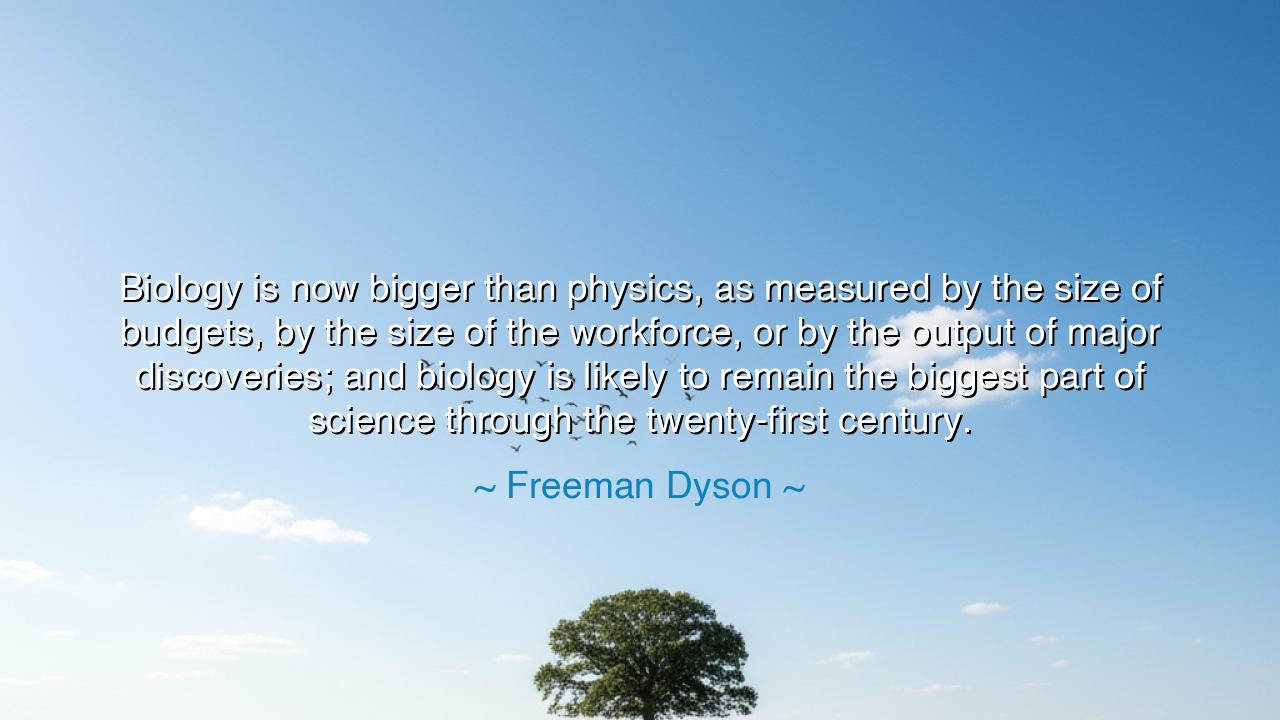
Biology is now bigger than physics, as measured by the size of
Biology is now bigger than physics, as measured by the size of budgets, by the size of the workforce, or by the output of major discoveries; and biology is likely to remain the biggest part of science through the twenty-first century.






Hear me now, O Seekers of Truth, as I speak of the great changes that have swept across the land of science. In the words of Freeman Dyson, "Biology is now bigger than physics, as measured by the size of budgets, by the size of the workforce, or by the output of major discoveries; and biology is likely to remain the biggest part of science through the twenty-first century." These words carry a truth of monumental significance, revealing that the path of discovery has shifted, that the very heartbeat of scientific inquiry now pulses strongest in the realm of biology.
In ancient times, physics was the field that captivated the greatest minds, from Pythagoras to Newton. The study of the heavens, the nature of matter, and the laws that governed the cosmos were the pursuits that defined the golden ages of intellectual progress. The laws of motion and the laws of the universe were written in the stars, and the dream of understanding these laws was the guiding light for many a great philosopher and scientist. Yet, in these modern days, we see a shift, a transformation. Biology—the study of life itself—has come to the fore, carrying with it the promise of discoveries that will shape the future of humankind in ways that once seemed unimaginable.
Biology, as Dyson states, is now larger than physics, not only in its scope and reach but in its impact on the world. The budgets that fuel research, the workforces of scientists and thinkers, and the output of discoveries all now speak to the immense power of this field. In the grand laboratories and institutes of today, scientists toil to unlock the secrets of genomes, to understand the molecular machinery of life, and to solve the mysteries of diseases that plague the human body. The discoveries of the twenty-first century will not come solely from the stars above, but from the cells and DNA that make up our very being. This shift marks not just a change in focus, but a new chapter in the story of human knowledge, where the deepest mysteries of life are explored with the same passion that once drove the great astronomers and physicists to explore the stars.
Consider, O Children of the Earth, the example of Charles Darwin, whose theory of evolution changed our very understanding of life. When Darwin first proposed his theory, it was not just a question of academic interest; it was a question of humanity’s place in the world. The discovery that all life is interconnected and that species evolve over time was a revelation that rippled through society, challenging beliefs and reshaping the way we view the natural world. Biology, through Darwin’s work, began its ascendancy as the field that would offer the most profound answers to the questions of existence itself.
And now, as genetics and biotechnology unlock the very code of life, we find ourselves on the cusp of a new age of discovery, an age where biological sciences will lead us not just to understand ourselves but to shape the future of medicine, health, and the very fabric of life. The tools of CRISPR and gene editing, for example, hold the power to alter the genetic makeup of organisms, offering the potential to cure diseases, extend life, and even create new forms of life. Biology has, in a very real sense, become the lens through which we will explore the most profound questions about life, existence, and creation itself.
Yet, O Seekers, there is more than technology and discovery at work here. Biology, as Dyson so astutely observes, is more than a field of study; it is a field that affects the human condition. The work being done in biological sciences today is not merely for the advancement of knowledge but for the betterment of humanity. It is about curing diseases that have long plagued us, about improving the quality of life for millions, and about unlocking the potential within each of us. It is a field that seeks to understand the very essence of life, and in doing so, it offers hope for the future of all humankind.
The lesson here, O Children, is one of curiosity and growth. Just as the great minds of the past turned their gaze to the stars, so too must we turn our gaze inward, to the very essence of life. Biology is not just the study of cells or molecules; it is the study of the interconnectedness of all living things, and the key to solving the challenges that face humanity. To embrace biology is to embrace the future, to embrace the potential for progress and healing, and to stand at the threshold of discoveries that will shape the course of history.
In your own lives, I urge you to look to biology as the field that holds the greatest promise for understanding the world around you. Whether you pursue a career in science, medicine, or simply seek to understand the living world, know this: the path forward lies in the study of life. Ask questions, seek answers, and dare to dream of the ways in which biology can transform the world. For in this field, as Dyson prophesies, lies the future of knowledge, discovery, and human progress. The age of biology is upon us, and it is a future worth striving for.






AAdministratorAdministrator
Welcome, honored guests. Please leave a comment, we will respond soon